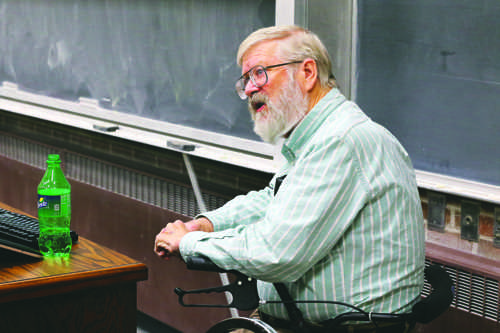Sky’s no longer the limit!

Michael Gaffey, a UND professor Space Studies, speaks during an astronomy event Monday evening at Witmer Hall.
October 14, 2016
The first of a series of space talks occurred on Monday in Witmer Hall on campus. Michael Gaffey, a professor in the Space Studies program, gave his talk on earth-approaching asteroids and the scientific and ethical issues associated with them.
In plenty of movies, asteroids have been a major, life-threatening problem, but real people don’t worry about them as much as Gaffey believes they should.
“This has a low probability but it has potentially massive consequences,” he said about the thought of an asteroid hitting the Earth. “If you wait long enough, it will happen.”
In Gaffey’s presentation Monday night, he talked about the three asteroids that hit planets within the last 110 years. In 1908, an asteroid hit the Earth in Siberia, near the Tunguska River. “We got lucky!” said Gaffey, throwing his arms up. “It happened in the middle of Siberia! Only the reindeer really suffered in that case.”
The asteroid could have easily diverted a little bit and landed in a much more populous area in Europe, potentially killing millions of civilians.
Another hit Jupiter in 1994, and the third was as recently as February 15, 2013. That one hit in Chelyabinsk, Russia. In Russia, many were injured, but it could have been a lot worse.
“We’ve been very lucky,” said Gaffey in reference to the fact that the asteroids have not hit anywhere with a large population or caused a major casualty count. “From a dinosaur’s point of view, they got unlucky and our ancestors got lucky because asteroids cleared the planet of them.”
Asteroid impacts are the only preventable natural hazard that can threaten civilization. Gaffey believes that knowing this gives the human race an ethical duty to make an effort to reduce the threat.
“It’s potent to basically look forward into things that have these risks and see what you can do about it,” said Gaffey.
Deflecting them or altering their orbits are the two ways scientists have figured out to reduce this threat. It’s just a matter of time until the technology to follow through these discoveries are made. Gaffey mentioned it could be anywhere within the next five to seven years.
“We don’t need a lot of money,” he said. “But we should spend enough money to basically get an understanding of exactly what the risks are and prepare accordingly.”
As of July 2016, over 700,000 asteroids have been discovered. But more are constantly being added.
“We’re finding thousands a year. Things we didn’t know were there,” Gaffey proclaimed.
The next probable predicted asteroid impact isn’t for another 30 years.
Gaffey made sure to point out in his presentation that asteroids are not only studied so we know when the next one to cross Earth’s atmosphere is. It is also important because they give insight into how Earth and other terrestrial planets were created. But that isn’t going to convince everyone these are important.
The most important thing Gaffey wanted the attendees of his talk to know was that an asteroid hit is inevitable.
“It’s not a matter of ‘if.’ It’s a matter of ‘when’ and how serious” he told the crowd.
He also believes that preparing for this is crucial. The asteroids aren’t going to keep targeting remote areas of minimal people.
“You can’t depend on luck forever. You have to be proactive in dealing with threats,” Gaffey stated. “And these are legitimate threats.”
Rachel Cox is a staff writer for The Dakota Student. She can be reached at rachel.a.cox@und.edu

